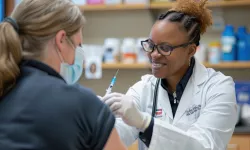Industry News

THOUSAND OAKS, CA — Amgen today announced that the U.S. Food and Drug Administration (FDA) has approved IMDELLTRA™ (tarlatamab-dlle) for the treatment of adult patients with extensive-stage small cell lung cancer (ES-SCLC) with disease progression on or after platinum-based chemotherapy. IMDELLTRA has received accelerated approval based on the encouraging response rate and duration of response (DoR) observed in clinical studies. Continued approval for this indication may be contingent upon verification and description of clinical benefit in a confirmatory trial(s).
"The FDA's approval of IMDELLTRA marks a pivotal moment for patients battling ES-SCLC. This DLL3-targeting therapy in ES-SCLC comprises a transformative option demonstrating long-lasting responses in pretreated patients," said Jay Bradner, M.D., executive vice president, Research and Development, and chief scientific officer at Amgen. "This approval further demonstrates our commitment to addressing aggressive cancers through our second FDA-approved Bispecific T-cell Engager (BiTE®) molecule. IMDELLTRA offers these patients who are in urgent need of new innovative therapies hope, and we're proud to deliver this long-awaited effective treatment to them."
"Lung cancer is a complex and devastating disease, and less than 3% of patients with ES-SCLC live longer than five years," said David P. Carbone, M.D., Ph.D., professor of internal medicine and director of the James Thoracic Oncology Center at the Ohio State University Medical Center. "In the DeLLphi-301 trial, the median overall survival was 14.3 months, with 40% of patients responding to treatment with tarlatamab. These responses were remarkably durable, representing a major advancement in the SCLC treatment paradigm."
IMDELLTRA is the first and only DLL3-targeting Bispecific T-cell Engager therapy that activates the patient's own T cells to attack DLL3-expressing tumor cells.
"After decades of minimal advancements in the SCLC treatment landscape, there is now an effective and innovative treatment option available," said Laurie Fenton Ambrose, co-founder, president, and CEO of GO2 for Lung Cancer. "Today's FDA approval marks a significant milestone for the SCLC community as the availability of a targeted bispecific therapy brings forward new possibilities to those living with this aggressive disease."
The FDA accelerated approval of IMDELLTRA is based on results from the Phase 2 DeLLphi-301 clinical trial that evaluated IMDELLTRA in patients with SCLC who had failed two or more prior lines of treatment, and who had received the 10 mg every two weeks dosing (Q2W) regimen. Results from the study found that IMDELLTRA at the 10 mg Q2W dose (N=99) demonstrated a robust objective response rate (ORR) of 40% (95% Confidence Interval [CI]: 31, 51) and median DoR of 9.7 months (CI: 2.7, 20.7+). The median overall survival (mOS) was 14.3 months, with final and complete survival data yet to mature.
The IMDELLTRA label includes a Boxed Warning for cytokine release syndrome (CRS) and neurologic toxicity, including immune effector cell-associated neurotoxicity syndrome (ICANS), in addition to warnings and precautions for cytopenias, infections, hepatotoxicity, hypersensitivity, and embryo-fetal toxicity. The most common (> 20%) adverse reactions reported among patients were CRS (55%), fatigue (51%), pyrexia (36%), dysgeusia (36%), decreased appetite (34%), musculoskeletal pain (30%), constipation (30%), anemia (27%), and nausea (22%). Permanent discontinuations due to treatment-emergent adverse events (TEAEs) were infrequent (7%). CRS was largely confined to the first and second dose, predominantly grade 1 or 2, and was generally managed with supportive care.

PHILADELPHIA and LEHIGH VALLEY, PA — Jefferson and Lehigh Valley Health Network ("LVHN") have signed a definitive agreement to combine, creating a leading integrated academic health care delivery system, alongside a national research university and an expanded not-for-profit health plan. The unified system, which would be in the Top 15 not-for-profit health systems in the U.S., will increase access to high-quality and affordable care, clinical research and health plan offerings and address health inequities for urban and rural communities in Eastern Pennsylvania and Southern New Jersey. The deal is expected to be completed later this summer, pending final reviews and execution of closing conditions. Jefferson and LVHN announced in December that they had signed a letter of intent to combine.
"We are delighted to take this next step toward combining with Lehigh Valley Health Network—it is the future, not only for our organizations but also for care in our region," said Joseph G. Cacchione, MD, Chief Executive Officer, Jefferson. "Through our integrated operating model, the combined organization will provide the communities we serve with access to the highest quality care, the benefits of continuous research and innovation, a network of specialists, clinical trials, and so much more, while also building an organization that prioritizes health through value-based care. This combination promotes access, choice, innovation, opportunity, increased equity and stability—for patients, physicians, faculty, staff, students and health plan members and our communities at-large."
Under the terms of the agreement, the systems will integrate clinical care, operations and identity to create a regional system that delivers the highest quality care to those it serves.
"We could not be more excited about what lies ahead for communities across Eastern Pennsylvania and Southern New Jersey," said Brian A. Nester, DO, MBA, President and Chief Executive Officer, Lehigh Valley Health Network. "As our collective teams worked these past months, we confirmed what we had believed to be true when we signed our initial letter of intent—Jefferson is the ideal partner for Lehigh Valley Health Network, our teams and our patients. We look forward to continuing the important work of improving the health and well-being of our communities together."
Jefferson and LVHN have long shared a commitment to community and improving lives. Both organizations have embraced models of care that prioritize the health and well-being of patients, investing in the growing field of population health management and quality-focused care services, which when combined will only accelerate. Upon closing, the integrated system will operate 30 hospitals and more than 700 sites of care, supported by more than 65,000 employed faculty, clinicians and staff. The combined organization will offer new educational opportunities for current clinicians and enable exceptional recruiting opportunities. It will expand health plan access that will help vulnerable, at-risk populations receive care to live well and stay out of the hospital. Lastly, the combination will strengthen financial stability, allowing for investments in innovative technologies and better patient outcomes.
Upon the closing of the transaction, Jefferson's Cacchione will continue to serve as Chief Executive Officer of the Jefferson enterprise. LVHN's Nester will serve as Executive Vice President/Chief Operating Officer of the Jefferson enterprise and President of the legacy Lehigh Valley Health Network, reporting directly to Dr. Cacchione. Dr. Baligh R. Yehia will serve as Executive Vice President/Chief Transformation Officer of the Jefferson enterprise and President of the legacy Jefferson Health, while continuing to report directly to Dr. Cacchione. The newly integrated Board of Trustees and leadership team will be comprised of members from both systems.
Both Jefferson and LVHN will continue to operate as independent entities until the combination closes. The parties are committed to ensuring the patients and communities they serve continue to have access to exceptional care from their clinicians during completion of this process.

CAMBRIDGE, MA – Takeda and AC Immune SA announced an exclusive, worldwide option and license agreement for AC Immune’s active immunotherapies targeting toxic forms of amyloid beta (Abeta), including ACI-24.060 for the treatment of Alzheimer’s disease.
ACI-24.060 is an anti-Abeta active immunotherapy candidate designed to induce a robust antibody response against the toxic forms of Abeta believed to drive plaque formation and Alzheimer’s disease progression. By inducing plaque clearance and efficiently inhibiting plaque formation in the brain, ACI-24.060 has the potential to delay or slow Alzheimer’s disease progression. ACI-24.060 is being investigated in the ongoing ABATE randomized, double-blind, placebo-controlled Phase 1b/2 trial to assess the safety, tolerability, immunogenicity and pharmacodynamic effects of the investigational immunotherapy in subjects with prodromal Alzheimer’s disease and in adults with Down syndrome.
“As pioneers in the field of active immunotherapy, we are developing an innovative approach that could change the treatment paradigm for Alzheimer’s disease and address the multifaceted burden that patients and the broader community face. We believe the maximum impact of ACI-24.060 can best be realized by partnering with Takeda at this critical juncture in its development, which will help us move rapidly into Phase 3,” said Dr. Andrea Pfeifer, CEO of AC Immune. “This agreement allows us to leverage the developmental expertise, strategic vision and financial capacity of an accomplished organization that has demonstrated its ability to execute the type of comprehensive global program required for Phase 3 trials in Alzheimer’s disease while allowing us to focus on completing Phase 1b/2 development and accelerating our efforts to replicate this success with enhanced funding for our early-stage pipeline.”
AC Immune will be responsible for completing the ABATE trial. Following option exercise, Takeda would conduct and fund all further clinical development and be responsible for all global regulatory activities as well as worldwide commercialization.
“At Takeda, we are committed to tackling some of society’s most debilitating illnesses, including Alzheimer’s disease. We are excited to partner with AC Immune on this ground-breaking treatment approach, which leverages novel technology with the potential to offer patients a treatment with differentiated efficacy, safety and ease of administration,” said Sarah Sheikh, M.Sc., B.M., B.Ch, MRCP, Head, Neuroscience Therapeutic Area Unit and Head, Global Development at Takeda. “Combining AC Immune’s deep experience with active immunotherapy approaches with Takeda’s expertise in neuroscience drug development and commercialization, we have an incredible opportunity to deliver real impact to the Alzheimer’s community.”
Under the terms of the agreement, AC Immune will receive an upfront payment of $100 million and be eligible to receive an option exercise fee and additional potential development, commercial and sales-based milestones of up to approximately $2.1 billion if all related milestones are achieved over the course of the agreement. Upon commercialization, AC Immune will be entitled to receive tiered double-digit royalties on worldwide net sales.
Further details related to the agreement are available in the Form 6-K filed today by AC Immune with the U.S. Securities and Exchange Commission (SEC). The effectiveness of Takeda’s license following option exercise is subject to the termination or expiration of any applicable waiting periods under the Hart-Scott-Rodino Act.

IRVING, TX — Vizient, Inc. hosted a policy briefing on Capitol Hill titled, "Medicare (DIS)Advantage: How MA Plans are Implementing Policies to Limit Access to Care," at the Rayburn House Office Building. The event featured remarks from Reps. Jasmine Crockett (D-TX) and Marc Veasey (D-TX), with recorded remarks provided by Rep. Valerie Foushee (D-NC) and was sponsored by Rep. Jake Ellzey (R-TX). The briefing, attended by a standing-room only crowd of more than 80 congressional staff and industry stakeholders, focused on the disruptions caused by Medicare Advantage (MA) organizations and how hospitals are navigating the myriad challenges to provide timely and seamless care to MA beneficiaries.
"Having recently met with healthcare providers in Texas's 30th district, I am acutely aware of the challenges posed by Medicare Advantage's problematic policies," said Rep. Crockett. "It's imperative we resolve these issues to prevent unnecessary delays or denials of care. Safeguarding patient access to essential healthcare services remains a top priority, ensuring our hospitals are supported, not hindered, by administrative burdens. I appreciate Vizient's leadership in facilitating this important discussion to help drive meaningful change."
Jenna Stern, associate vice president of regulatory affairs and public policy at Vizient, moderated a discussion featuring a distinguished panel of key healthcare leaders, including:
- Christopher K. Dorman, MA, MBA-HCM, FACHE, president & CEO, Southwell – Tift Regional Health System, Inc.
- Jeff Francis, MBA, vice president & CFO, Methodist Health System
- Janet Hadar, MSN, MBA, FACHE, president, UNC Hospitals
The panel of experts highlighted the ongoing challenges with certain MA plans, such as confusion among beneficiaries about their coverage, excessive prior authorization denials, reimbursement issues and gaps in data reporting to CMS. The panelists proposed several solutions to enhance patient access and care delivery. Recommendations included requiring MA plans to have provider access comparable to Medicare, streamlining the prior authorization process, reducing timelines for responding to denials, and improving MA data reporting on prior authorizations and denials, among other recommendations.

UPPER NYACK, NY — The Global Healthy Living Foundation (GHLF) published a policy paper authored by Robert Popovian, PharmD, MS, GHLF’s Chief Science Policy Officer. The paper, titled “Challenges in Adult Vaccination: Policy Strategies for Sustaining Access and Supply,” details the benefits associated with the current vaccine access and payment model for adult vaccination in the United States. It highlights the potential negative consequences if Pharmacy Benefit Managers (PBMs) subvert the vaccine reimbursement landscape, which would in turn undermine the important public health role that pharmacists play.
Dr. Popovian's report addresses practices of PBMs that can limit patient access and disrupt the vaccine supply. The paper explains that PBMs complicate the vaccine distribution process by enforcing restrictive policies involving delayed payments, complex authorization processes, or insufficient reimbursement rates. These practices not only jeopardize the financial stability of pharmacies but also limit the range of vaccines that pharmacies can offer.
"Pharmacists are tasked with providing essential health services, including vaccinations,” said Dr. Popovian. “Suppose PBMs are allowed to impose access restrictions by providing inadequate reimbursement for the sole purpose of profiteering. Such actions would disrupt the current vaccination ecosystem in pharmacies, which ensures strong patient access, and critically, could endanger the long-term vaccine supply.”
Pharmacists as Accessible Health Providers
Highlighting the crucial role of pharmacists, the report points out that they are often the most readily available healthcare providers, especially in underserved communities.
"Pharmacists are on the front lines, particularly in areas where other health care services might be limited,” said National Association of Chain Drug Stores President and CEO Steven C. Anderson. “It is vital for the people whom pharmacists serve that PBMs are not permitted to manipulate or restrict access to vaccines, medications or services that are imperative for public health."
The paper details how current PBM policies, if allowed, will undermine this accessibility, particularly affecting low-income neighborhoods and minority communities where pharmacies play a critical role in vaccination.
Call-to-Action for Competitive Market Reforms
The paper calls for safeguards preventing PBMs from limiting competition and restricting vaccine access. It also highlights the continued coverage of all adult vaccines by private and public insurers, maintaining the current payment model for easy vaccine access and allowing patients to receive vaccinations at community pharmacies without incurring out-of-pocket costs.
Dr. Popovian further emphasized the broader impact of these reforms. “Implementing these policies will not only enhance vaccine accessibility but also strengthen the overall health care system,” he stated.
To learn more, download the full report.

St. Louis-based nonprofit and Catholic healthcare network Ascension, that operates 140 hospitals across more than a dozen states and Washington, DC, detected unusual activity in their network systems on May 8th and determined it was a cybersecurity incident. According to the news release, their team responded immediately, notified the appropriate authorities as well as business partners, and engaged Mandiant, a third-party expert, to assist in the investigation and remediation process.
“Safely caring for patients remains our highest priority as we navigate this cybersecurity incident,” per the release. “We are actively supporting our ministries as they continue to provide safe, patient care with established downtime protocols and procedures, in which our workforce is well trained. It is expected that we will be utilizing downtime procedures for some time. Patients should bring to their appointment notes on their symptoms and a list of current medications and prescription numbers or the prescription bottles so their care team can call in medication needs to pharmacies. We are working around the clock with internal and external advisors to investigate, contain, and restore our systems following a thorough validation and screening process. Our investigation and restoration work will take time to complete, and we do not have a timeline for completion.”
Systems that are currently unavailable include electronic health records system, MyChart (which enables patients to view their medical records and communicate with their providers), some phone systems, and various systems utilized to order certain tests, procedures and medications. The release stated that they have implemented established protocols and procedures to address these particular system disruptions in order to continue to provide safe care to patients.
Certain non-emergent elective procedures, tests and appointments have been temporarily paused. Due to downtime procedures, several hospitals are currently on diversion for emergency medical services in order to ensure emergency cases are triaged immediately.

SAN FRANCISO, CA — Otsuka America, Inc. (OAI) announces Otsuka Precision Health, Inc. (OPH), a company that will serve as a catalyst for delivering the right interventions at the right time along patients’ and caregivers’ unique health journeys, ranging from connected health solutions to digital therapeutics, all powered by advanced analytics tools like artificial intelligence. OPH will focus on the patient experience as a core piece of improving how better outcomes might be achieved across nephrology, mental health, and beyond.
The recent U.S. Food and Drug Administration (FDA) clearance of Rejoyn™ is the first prescription digital therapeutic authorized for the adjunctive treatment of major depressive disorder (MDD) symptoms. OPH will serve to commercialize Rejoyn™.
“Changes are needed to realize the potential of technology in health, and we’re ready to boldly address the barriers patients face in receiving care by taking a fundamentally new approach,” said Sanket Shah, president of OPH. “This Company will allow us to build on our commitment to the digital and technology space and continue building momentum with products such as, Rejoyn™, in a way that traditional pharmaceutical companies have not been able to explore.”
Combining the evidence-based rigor of pharma with a data-first focus on a more individualized approach to supporting patients, OPH has a unique opportunity to bring promising innovations to market quickly. Otsuka is deepening its commitment to the meaningful role technology can play in the lives of patients and the care teams that surround them.
“At this time there is a great desire for alternative therapies and treatments in the mental health space, especially given the outpaced demand in recent years,” said Shah. “New interventions that better connect, engage, and personalize care will be welcomed by patients and providers.”

CHARLOTTE, NC — Premier, Inc. announced a strategic partnership with AstraZeneca called Uncover CKD - Care Collective aiming to identify patients with undiagnosed clinical chronic kidney disease (CKD); raise awareness of undiagnosed CKD among healthcare providers; and inform U.S. health systems that want to improve or develop and implement their strategies for CKD diagnosis, treatment and management.
In the U.S., more than 37 million adults have CKD, and the prevalence is rising. Of these adult patients, 90 percent do not know they have CKD. Total inflation-adjusted Medicare expenditures for patients with end-stage renal disease increased to $53 billion in 2019. Among CKD patients, the cost of preventable hospitalizations is $79 million.
Through collaborative initiatives and scalable solutions from across the Premier enterprise, including its PINC AI™ technology and services platform, the Uncover CKD - Care Collective is addressing undiagnosed and rising CKD and the resulting economic burden to the U.S. healthcare system. The partnership with AstraZeneca demonstrates a commitment to implement and learn about innovative approaches to driving optimization of guideline-directed medical therapy for patients.
“We’re thrilled to be working with AstraZeneca and Premier member health systems to help solve the myriad challenges CKD presents to patients and our healthcare system,” said Leigh Anderson, Chief Operating Officer, Premier. “The Uncover CKD - Care Collective initiative highlights the impact collaborative partnerships across life sciences organizations and health systems – coupled with actionable real-world data (RWD), artificial intelligence (AI)-powered clinical and operational solutions, and best-practice consulting and collaboratives – can have in improving the care and cost of treating chronic diseases. As our collective work moves the needle on the rate of CKD diagnosis, those patients previously undiagnosed can begin to be treated and their conditions managed, limiting down-the-line costs associated with more severe disease stages.”
The Uncover CKD - Care Collective is poised to make significant strides in improving CKD diagnosis and advancing patient care through the utilization of:
- PINC AI™ Applied Sciences (PAS) RWD leveraging the PINC AI™ Healthcare Database, laboratory data and technology to identify high-volume areas of unidentified, at-risk patients; screen undiagnosed CKD patients, estimate prevalence and report hospital-specific patient counts; and describe patient characteristics and the clinical and economic outcomes of undiagnosed CKD. This discovery phase work has been completed and findings disseminated to characterize the burden of CKD across the health systems, prioritize and focus hospital-level initiatives, and commit to sustainable organizational change.
- PAS Improvement Science’s Health System Awareness Package, including provider and patient education, provider resources and workflow processes as well as support for participating health systems through provider engagement – all created to be scaled broadly across Premier’s health system network.
- PINC AI™ Stanson AI-powered technology, including clinical decision support and real-time alerts integrated into the provider workflow, to help strategically modify provider behavior to improve CKD screening, diagnosis and care quality.
- PINC AI™ Advisory Services to actively engage physicians, foster mutual accountability and drive clinical transformation and quality improvement efforts around CKD diagnosis, treatment and management throughout the health systems.
- Premier Pharmacy and Group Purchasing Organization resources to optimize medication management protocols and streamline operational processes for enhanced efficiency and positive patient outcomes.
- PINC AI™ Population Health Management Collaborative, including member Accountable Care Organizations (ACOs) and those on the transformation to value-based care, to facilitate idea exchange and best practice sharing.
- Health system collaboration to share project outcomes, publish a white paper, develop a poster presentation for the National Kidney Foundation and present findings at Premier’s 2024 Breakthroughs Conference & Exhibition.
“Through commitment to AstraZeneca’s medical missions of putting patients first and following the science, the Uncover CKD program is applying RWD to create urgency to diagnose and treat patients with CKD. With this innovative partnership we are leveraging relationships with health systems to improve care for 2.8 million patients identified to benefit from earlier CKD diagnosis and treatment,” said Rachele Berria, Vice President and Medical Head, US BioPharmaceuticals, AstraZeneca.
Health System Selection Criteria
In the selection of target health systems for the Uncover CKD - Care Collective, the project team considered disease burden, patient composition (e.g., age, sex, race, ethnicity), payer composition (e.g., Medicaid, Medicare, uninsured), hospital region (geographic diversity), urbanicity of served population, teaching status and hospital size. Priority was given to health systems serving many socially disadvantaged patients (i.e., health equity). For patient outreach efforts, the project team provided screening algorithms to the target sites so that they can identify socially disadvantaged patients with undiagnosed CKD for targeted outreach.
Hospitals and health systems in the U.S. can request access to the online PINC AI™ Community “Chronic Kidney Disease (CKD): Diagnosis and Mgmt.” to obtain outreach materials that have been developed as part of the Uncover CKD Project such as educational resources and tools for patients and healthcare professionals. Premier will work with respective hospitals or health systems to provide relevant resources, based on needs.

DALLAS, TX — Atrial fibrillation, or AFib, is the most common type of irregular heartbeat, estimated to affect about 12.1 million U.S. adults by 2030. The abnormal firing of electrical impulses causes part of the heart to quiver, or fibrillate, often leading to complications and up to a fivefold increased risk of stroke. To help ensure all patients with AFib receive the most appropriate care, the American Heart Association is launching a new effort to educate and engage pharmacists, an important but underrepresented voice in AFib care.
“Pharmacists are an integral part of the multidisciplinary team to optimize care for individuals with atrial fibrillation,” said Cody Parsons, APh, PharmD, BCCCP, manager of clinical operations for Stanford Health Care's cardiovascular health service line. “The insight of pharmacists in evaluating the medical complexity and use of multiple medications is essential in facilitating safe and effective anticoagulation and ultimately preventing life-altering medical consequences of AFib.”
This new effort, being conducted through June 2025, is the latest phase of the Association’s Four Fs of Atrial Fibrillation initiative, supported by Bristol Myers Squibb-Pfizer Alliance. The Four Fs are patient health concerns impeding guideline-directed anticoagulant therapy, including:
- fear of falling,
- fear of bleeding,
- forgetfulness, or cognitive dysfunction and
- frailty.
Pharmacists are often not consulted in the decision-making conversations for Afib patients during the patient care journey. During this next phase of the initiative, the Association will convene pharmacists in a roundtable event to identify gaps and opportunities related to AFib in this field. The Association then will share resources and insights nationally across thousands of hospitals and outpatient clinics.
AFib is often only detectable during physical examination, although some affected people may experience fatigue, rapid and irregular heartbeat or other discomfort. The use of anticoagulant therapy to reduce stroke risk is supported by science, but many patients remain untreated or undertreated.

WASHINGTON, DC — The American Hospital Association (AHA) released a new report showing that hospitals and health systems continue to experience significant financial pressures that challenge their ability to provide 24/7 care for the patients and communities they serve.
“As this report clearly highlights, increased expenses, workforce challenges, and growing administrative burden are unsustainable and creating headwinds and obstacles that threaten access to care for millions of Americans,” said AHA President and CEO Rick Pollack. “The AHA urges Congress and the Administration to take action to strengthen hospitals and health systems and bolster access to care for all patients and communities.”
In 2023, data show that hospitals and health systems continued to face substantial challenges due to higher costs for labor, drugs, and supplies. At the same time, reimbursements from Medicare and Medicaid did not keep pace with these mounting costs, and hospitals and health systems increasingly encountered challenges navigating onerous commercial insurer practices such as denying and delaying access to and payment for patient care. These headwinds persist in 2024 and have been further exacerbated by the recent unprecedented Change Healthcare cyberattack, forcing many hospitals to dip into their diminishing cash reserves to maintain operations.
Key findings from the report include:
- Economy-wide inflation grew by 12.4% between 2021 and 2023, more than double the 5.2% growth in Medicare reimbursement for hospital inpatient care. This makes it harder for hospitals to maintain access to care and invest in cybersecurity and cutting-edge treatment.
- Hospitals and health systems incurred significant underpayments for several essential and complex health care services in 2023, including:
- Payments for inpatient behavioral health services were on average 34% below costs across all payers.
- In the outpatient setting, payments for costly burn and wound services were on average 43% below costs across all payers.
- Hospitals and health systems face mounting administrative burden and costs due to certain commercial health insurer practices like prior authorization and denials. At the same time, health insurance premiums grew twice as fast as hospital prices in 2023.
- Increasing drug prices and workforce challenges continue to cause hospitals financial stress.
- In 2023, the median annual list price for a new drug was $300,000, an increase of 35% from the prior year.
- 2023 saw the most drug shortages in over a decade; there were an average of 301 drugs in shortage per quarter, an increase of 13% from the previous year.
- Hospitals’ labor costs, which on average accounts for 60% of a hospital’s budget, increased by more than $42.5 billion between 2021 and 2023.
The full report is available here, along with a one-page executive summary.